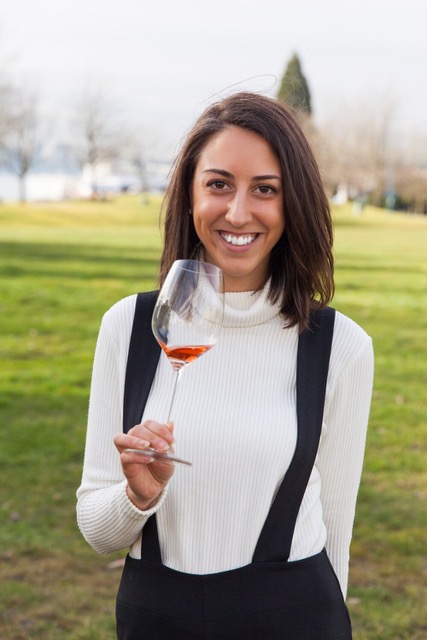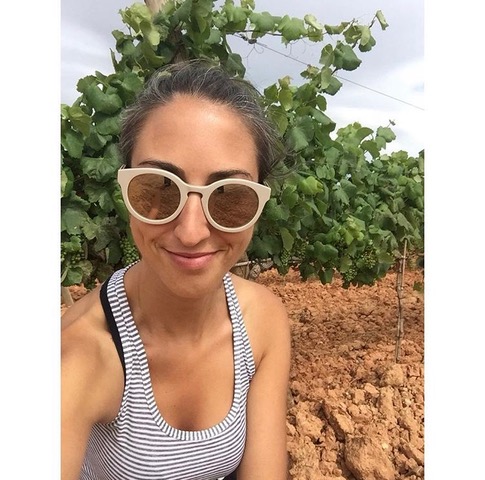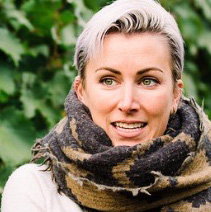
Wine Culture Magazine

Jessica Luongo. Supplied photo
Meet Jessica Luongo, co-founder and Director of AmoVino Wine + Spirits, an importing agency founded in 2015 by herself and business partner Marisa Varas. Established when they were 24 and 27 years old respectively, they are not only a female run importing agency, but they are the youngest agents in British Columbia (that I’ve been able to find). On top of this, Jess (and Marisa) deal exclusively with family farmers who work organically, and this is a MINIMUM standard; most of the businesses they represent practice holistic farming and low intervention winemaking methods.
I can’t stress enough how valuable it is to have purpose driven businesses within our grasp, and Jess leads the conversation of vision and purpose, and STICKS to it, regardless of whether it is the more difficult path. I am proud to share her story today, and demonstrate to so many up and coming wine professionals (and women) what is possible if you lead with possibility.
Laura: Alright. Hi Jess! Tell me about what’s going on in your world these days?
Jess: Hey! Thanks for having me! Right now is a really fun time, we are reflecting on 2019 and analyzing a lot of data—which the geek in me loves! AmoVino is in our 4th year now so I’m striving for more balance, spending time with family, working on initiatives and projects I’ve been dreaming up for a while, and trying to get into a yoga class somewhere along the way!
L: Your background isn’t restaurants, but wine has always been in your world… can you tell us more about that?
J: Actually I do have a background in restaurants, but many are surprised to learn that. My first job was at 15 years old as a host at Red Robin, then Milestones, and finally with MJG at Yaletown Brewpub and Taylors Crossing (Red Truck Beer was made by Brewmaster Dave Varga on-site, at the time). I worked myself from host to expo to (the only female) busser to server. Meanwhile, my Nonno was always talking to me about wine, having winemakers at our table growing up, and getting me to open the bottles at dinner in front of them—I cringe at the memory now. As well, every year we’d visit my mom’s family in Yakima Valley, Washington but her family was in beer and had a modest hop ranch. So there really was no hope for me not ending up in the alcohol industry, one way or another I was a goner!
L: What (or who) was the spark that set you on the path of wine?
J: It was when I moved to Rome at 19 and discovered what red wine was all about. My mom and sister had come to visit me and we ordered a bottle of local wine at dinner that the server highly recommended. It was Montepulciano and I was captivated from the first sip. I had to know everything about it. I’d never had such an immediate and emotional response to a beverage. Like some freaky joke, when I returned home to Vancouver and started working at my Nonno’s agency, I discovered that this wine was not only in his portfolio, but was actually the very first winery he ever signed and used to apply for his import license with. The formidable woman behind that winery, Ms. Marina Cvetic of Agricola Masciarelli, has always been an idol of mine since I learned her rather incredible story, and felt she exemplified characteristics I strive for as a business woman and leader. We just signed them into the AmoVino portfolio, and it feels a little surreal, a kind of personal full-circle moment.
L: That is an amazing story! So now that you’re an importer, can you take me through the details of what you’d consider a day-in-the-life?
J: Every day is a little different, which is one of the things I absolutely love about my job. Generally it always starts quite early, and with a lot of Americanos. I really like those quiet and still spaces in the early hours to make my to-do lists (I love lists!) and talk to my European producers if needed. Overall, I wear many hats, but I’d say there are four main roles I try to fill daily: supporting my sales team and acting as a resource for them, managing import and delivery logistics (globally to port of Vancouver, and locally to each account), designing and executing marketing initiatives for our six domestic and seven import producers, and making sales calls to taste with somms. Plus a million other little things! I’m really fortunate to have an incredible business partner in Marisa who takes care of the other billion+ things, especially the ones I’m not strong at. Everyday we work together as a team to make sure we’re doing absolutely everything we need to be doing.
L: Your portfolio focuses exclusively on organic wineries (with some newly incorporated spirits and ciders). What made you decide this? Did you know much about organics in the industry before you made this business choice?
J: Lots of answers for this one! Marisa and I started off knowing we wanted to represent authentic products that were made naturally, and organics is really the base of that. You can’t be biodynamic without being organic, and conversationally with both trade and consumers, organics is our first touch point because it’s familiar and (mostly) understood. From there we can relate to regenerative farming with biodynamic practices, carbon emission off-sets, closed loop water systems and strategic irrigation, but we can’t go there without establishing what organic farming really is first. We coincidentally found that products made without the use of unnecessary chemicals or additives not only tasted more delicious to our palates, but it made our bodies feel good too. I’ve got some pretty smart people like Michael Abbott, Vineyard Manager at Blue Grouse Estate Winery, who is generous with answering my stream of questions around farming and plant health. ’Sustainability’ has always been something I’ve been concerned with, even as a kid. The more I learned about the creative ways wineries and distilleries are bending over backwards to try and do their part to practice business in eco-friendly ways, the more I wanted to be involved. It’s a murky topic and I think a lot of people find it hard to discern what’s what and who’s real, which just makes me want to participate more, and to help explain and educate why these family farmers are worth supporting. It does mean we’ve dropped producers who weren’t working quite up to our (strict) standards, but at the end of the day I want every single person who works for and with AmoVino to feel good and confident about what they’re consuming.
L: I love the commitment to your vision. In terms of B.C.’s organic and sustainable practices, what are we doing well, and where do you think we need to most improve?
J: I think we’re doing a good job at making sustainability a part of our daily local conversations, and it’s incredible to see the shape our B.C. wine regions are taking, even in our infancy. Currently New Zealand is leading and striving for 20% certified organic wineries for 2020, but I’ve read that by 2021 the Okanagan will globally have the highest percentage of organic wines produced from the area. That’s a huge deal! Saving our soils and all the creatures that live in and off the land, reducing the amount of pollution being put into the air and ground—the list of benefits are long and they are essential for life.
Now more than ever we need to keep pushing boundaries and it doesn’t end at organics. I truly believe we need to look at our farms as entire ecosystems, with each plant, herb, tree and animal playing a vital role in the overall health of that land. Planting cover crops that increase nitrogen and other essential vineyard nutrients, cultivating rich biodiversity with a wide range of plants that help elevate microbial activity and good bacteria in the soils, working alongside natural wildlife like bees, chickens (their poop is high in carbon which is great for compost and they eat invasive bugs and pests) and embracing the wild life around you (like a body of water with fish and other life nearby, which is also your responsibility) are all just some of the things farmers are starting to really look at now in B.C. Likely because in our 50-something vintages of B.C. wine we can now just start to see the consequence of mono-crop farming with harsh chemicals. Organic and holistic farming is not only the best way to preserve our land for the future, it’s really working off the practices of our past ancestors before any chemical ‘treatments’ were created and introduced to the market around the 1930s. This is important because great wine is grown first, and then if well handled by a skilled winemaker, it becomes an exceptional wine.
I also think it’d be super cool to see Canada mandate ingredient lists on bottles of wine; I mean it’s 2020. We’ve been ‘on the brink’ of our B.C. wines really being discovered by the rest of the world for a few years now, but our lack of government label standards is a huge international hurdle. Even for imported wines there are only 7 specific rules for wine labels that mostly have to do with naming conventions, and I see bottles every day that break those rules. So it seems there’s a lot that’s not being governed or regulated. Wine is a food, and even as modern of a country as Canada, and with how heavily regulated our food processing and packaging is, wine is totally exempt from an ingredient list and I’ve never understood why.
There’s many things I’d love to see: I want grape growers who are trying to practice organic and biodynamics to have access to resources and products that will allow them to shift and thrive. Summerhill Pyramid Winery volunteers their time and donates biodynamic prep ‘starters’ and seminars at the winery for any other wineries looking to transition and it’s that kind of outlook that I think is just beautiful. I want winemakers to challenge each other and be open to giving and receiving feedback and critique so we can collectively create truly amazing Canadian wine. Because all our AmoVino wineries, local and international, are aimed at preserving the integrity of their soils and needing to intervene as little as possible in the cellar, it’s been incredibly resourceful to connect them all to share and swap techniques that have worked for them in their unique regions. I just want to drink delicious and responsibly made wine from my home and proudly tell the world about it and I don’t think I’m alone in that.
L: Who is leading the global conversation in organic farming in the wine industry?
J: I think it’s this next generation who’s leading the global conversation, because they have to demand it. Consumers have to show producers that this is what they care about and want to see more of. In response to this, I think companies like ConoSur have done a great job at setting the bar high, and telling/showing consumers exactly what they do. The transparency is refreshing.
L: If you could impress onto people ONE thing that is important to consider when buying a wine, what would it be?
J: “How was this made?” It’s a question that encompasses a lot: how was this farmed, and with what products, how was it fermented and was there anything added to it at any point, how did it get into my hands and do I feel good about these answers?
L: Any phenomenal pairings as of late?
J: YEP. Blue Grouse’s Quill Q Red 2017 and roasted red pepper cashew cream pasta with smoky vegan sausage from a few weeks ago—it blew me away. Everything. Just. Worked. Each sip and bite kept getting better and better and that’s the real sign of a great pairing.
L: THAT WAS WITH ME! I agree. Incredible pairing, and so off the cuff!
Who would you say has the most underrated wine list in the city (as in, a diamond in the rough—undiscovered)?
J: The Mackenzie Room. Literally a diamond, in a rough area. I recently took a wine friend there for the first time and he was like ‘every wine on this list is a banger’ and he wasn’t wrong. They feature just local and low intervention wines and it’s always a good time.
L: How about your guilty wine pleasure?
J: Cheap Riesling, drunk way too young! Clare Valley, Australia has some great value and is one of my go-tos.
L: If you were a winemaker, what would you be making?
J: I have always had this dream to make wine from my family’s tiny vineyard of Fiano and Aglianico in our teeny village, in Southern Italy. Last time I was there, I found a cow horn peeking out of the soil at the end of the one of the rows and in Italian I asked my Zio, ‘What is this?’ He looked at me and said, ‘oh it’s just something our fathers have always made us do, don’t worry about it, it’s weird…’ and I asked ‘something like biodynamic farming?’ He looked at me confused and said I’d have to ask my other Zio, because it’s just what they do. So we’ll have to see what exactly we’re working with and if that could ever happen one day!
L: Are there any exciting wine events coming up we might find you attending this year?
J: Yes! I’ll be speaking as a panelist at the Sensory Symposium on February 24th at VV Tapas Lounge alongside YOU and some really fantastic industry professionals. I’ll also be around the room at Vancouver International Wine Fest and soon we’ll be announcing an exciting plant-based wine paired dinner for charity, lots of fun things coming up around town! I’ll also be travelling to Puglia for Radici del Sud in June and I couldn’t be more excited to go back to Italy!
L: Thanks so much for your time and sharing Jess!

Jessica Luongo. Supplied photo
Dog or cat? Dog.
Negroni or Boulevardier? Negroni for sure.
Most overhyped wine trend? ‘Sans Souffre.’ or ‘Sulphite Free’ aka ‘added sulphite free’. A (very) small amount of added sulphites can be the difference between delicious wine and faulted wine. No brainer in my books.
Most despised wine term? Does “Certified Somm” count?
Most underappreciated grape? Trebbiano. Cheap and fresh or aged and vintage this chameleon grape is delicious when handled properly and also (oddly) what most white wine vinegar in Italy is made from.
What grape would your mom be? 100% Pinot Gris.
Go-to hangover cure? Cold pressed organic green juice and fried potatoes.
High school prom song? The Graduation Song by Vitamin C. Isn’t that everyone’s?
Flute or coupe? Flute.
WSET or CMS? WSET personally, my job requires a small amount of wine service.
Thanks Jess!

Laura Starr is a freelance writer, sommelier and educator, with 20 years under her belt in the hospitality industry. She is also the Wine Editor of VITA Magazine, and sits on the board of directors for the BCHF.

Laura Starr is a freelance writer, sommelier and educator, with 20 years under her belt in the hospitality industry. She is also the Wine Editor of VITA Magazine, and sits on the board of directors for the BCHF.
© 2024 Vitis Magazine